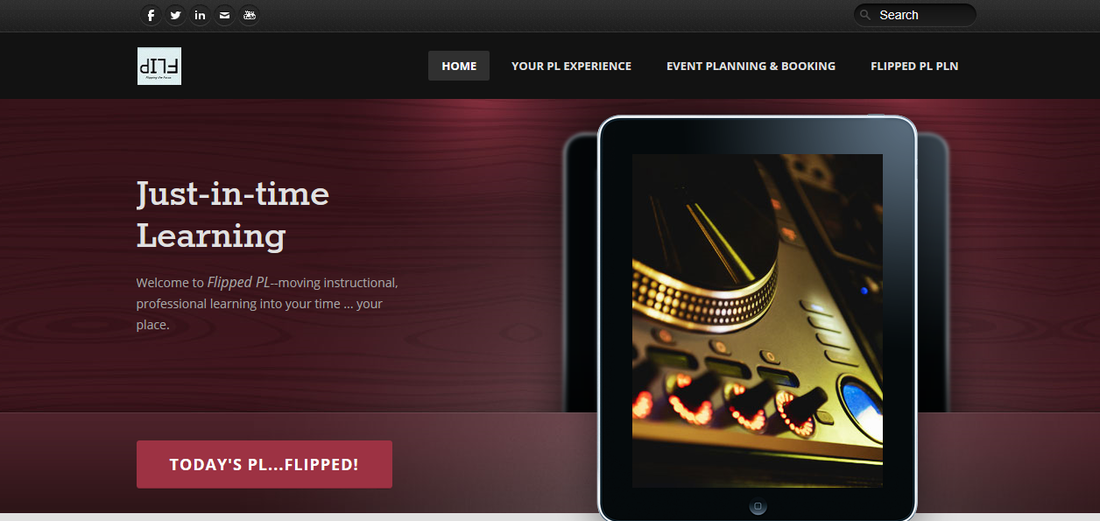Introduction
After a successful presentation and excellent opportunity to network at this year's Small School Summit (UCDSB), I've been wondering what's next for the team at Flipping the Focus? Aside from maintaining and continuously improving its current focus around direct support of student learning--both in- and out-side--of the classroom, what else could we be doing, who else could we be supporting, and how could this be accomplished? How will we use the 'pockets' of excellence in our system to take the personalization of student learning to the next level?
Although it sometimes feels like yesterday, I began the 'journey' into Flipped Learning nearly two years ago, and I'm continuing my learning around ways that our system can continuously improve the conditions for growing student engagement and achievement.
Along the way, I've met so many educators who are passionate about and continuously seeking to develop their craft and are devoted to building strong relationships with their students. It is their drive to want more for themselves and their students that helps to drive my ambitions to not only participate in their learning but also to help fashion opportunities for collaboration.
What's Missing?
This is why I not only feel, but after numerous conversations with other educators, know that there's something missing from the landscape of professional development models available to educators.
Across the province of Ontario, collaborative inquiries are taking place at all levels--system, school, group and individual levels. These inquiries, for some time, have established that the most successful professional development is that which is job-embedded. They have also shown that professional learning occurs best through contexts that are substantive and collaborative, rather than directive.
These characteristics bear a striking resemblance to the learning opportunities that we're working very hard to provide for our students--experiential, problem-/inquiry-based, collaborative yet personalized. In short, how our students learn and want to learn is also similar to how we learn or are seeking, as adults, to learn.
And if we're using flipped instruction to engage and help our students improve learning outcomes, then why not use flipped instructional techniques to further engage and improve adult learning outcomes? Would this not be a potential means by which ongoing professional learning could be...and, in some ways, better...facilitated?
I believe that this is, largely, an untapped area of exploration for Ontario and could be an effective means by which we support modern-day, educator professional learning networks (PLNs) to reaching greater degrees of success. Perhaps, the success (as experienced by reports of greater teacher efficacy) of 'flipping' professional learning will come as a result of truly addressing the individual learning needs of educators. As Bergmann & Sams (2014) have noted in their work, "We have seen the impact of intentional content and coaching on teachers...Personalized digital resources that are created for teachers, when combined with a coaching model of professional development, set the stage for highly efficient innovation."
A Successful Flipped PLN?
Personalizing the educator learning experience involves, in part, moving whole-group instructions and presentations into the time and space of teacher-learners. This can be accomplished by flipping this portion of the learning experience through the use of well-designed and timely-delivered videos, readings, and discussion forums.
But, as blogger and Digital Learning Coach, Crystal Kirch, notes about flipped learning, it's not about the videos. The format of first-exposure learning is but a vehicle to helping us determine the best use of face-to-face time with one another. For example, modelling [and participating] in conversations that stimulate the thinking of all [is] an example of what it means to be a part of a PLN (West & Staub, Content-Focused Coaching) and the contexts that we experience together are what anchors the discussion. For example, professional dialogue could arise and be facilitated by a supportive other (coach, administrator, ...) after watching a coach teach a lesson and presenting their thinking about the lesson.
What is a Flipped PL Opportunity? And What Will Define its Success?
Technology Integration Specialist, Kristin Daniels, writes that the video content their district has been using with educators has helped them to cultivate conversations about how they can use "...this flexible content to move [their] students and teachers forward quickly and intentionally." As for intentionality, providing up-front video content will help to personalize professional learning and allow educators to focus on working together--engaging in inquiry, discussing their observations/thinking, asking questions/generating new learning problems, and planning next steps.
A successful opportunity will also respect the Pillars of Flipped Learning: Flexible Environment, Learning Culture, Intentional Content, and Professional Educator (featured, below).
At Flipped PL, we're exploring the potential of a web-based service that will allow for co-construction of a 'flipped' professional learning experience for you and/or your group/organization. The model consists of three parts (as follows):
Part 1: Consultation
-schedule an initial consultation to learn more about the experience we can generate together
According to edsurge.com, one structure that will be used to facilitate a 'flipped' professional learning opportunity for you and/or your group/organization is as follows:
Part 2: The 'Flipped' Experience
1-create and provide a personalized overview of the professional learning opportunity for participants
2-provide required videos, links, readings, etc. to participants via password-protected web-page (your experience is unique to you and/or your group/organization)
3-offer technical support and provide an opportunity for participants to engage in a discussion forum in real time (i.e., during this part of the learning experience)
4-bring closure to the learning experience by providing participants with an exit survey--survey results being used to lauch Part 3 by generating discussion when participants gather together, face-to-face
Part 3: The Follow-up Experience
-includes a follow-up, face-to-face component in which participants will bring their learning and reflections into a workshop experience that can include observation and documentation of student thinking--truly blending the learning opportunity and experience
Looking Ahead
Thanks for your continued interest in Flipping the Focus. I look forward to your comments about what you feel defines a successful PLN--e.g., a PLN that incorporates Flipped Learning--and/or stories about how you or your district is engaged in flipping professional development. The collection of comments that you provide will help serve as a basis for future decision making about the direction of Flipped PL.
In the coming weeks, I hope to keep our community updated as to what others are saying about the personalization of professional development. And if you'd like to present your experience as a guest-blogger and have your bio included on Flipping the Focus, please feel free to get in touch with me at [email protected].
In the meantime, if you're seeking to collaborate around creating and providing a professional learning opportunity that has a 'flipped' component, I would love to work at this with you. To help facilitate our on-line work, check out Event Planning & Booking from my new web-service at Flipped PL. And if you know of others who would also love to collaborate around flipping their professional learning, please feel free to pass along the information to them (or who knows ... maybe use the web-service as we work as a small group to plan your next professional learning experience).
You might also find that you might want to experience what a flipped professional learning opportunity 'looks', 'sounds' and 'feels' like. To help you with some decision-making around what you could do to facilitate a flipped professional learning opportunity, feel free to contact me about working through a sample module.
Through Flipping the Focus, let's help to champion the most important relationships in our midst--the collaborative (teacher-student and teacher-teacher). There's so much that we can accomplish together!
Sincerely Yours,
Chris Stewart, OCT
Program Resource Teacher-Mathematics
Upper Canada DSB
Brockville, ON

 RSS Feed
RSS Feed


